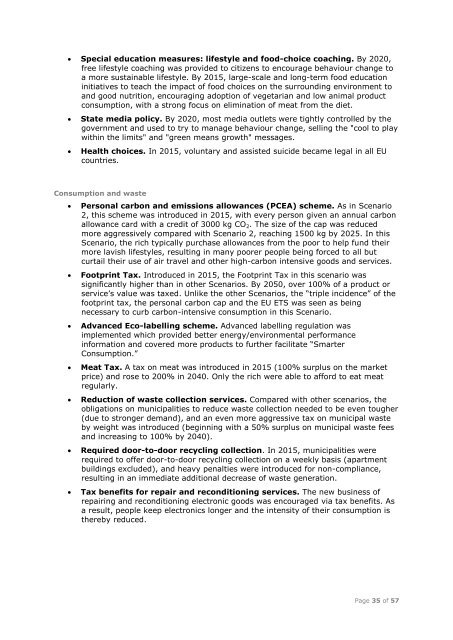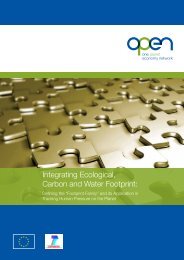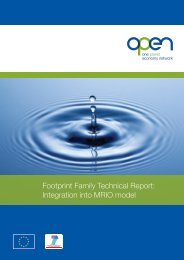OPEN: EU Scenario Storylines Report: - One Planet Economy Network
OPEN: EU Scenario Storylines Report: - One Planet Economy Network
OPEN: EU Scenario Storylines Report: - One Planet Economy Network
Create successful ePaper yourself
Turn your PDF publications into a flip-book with our unique Google optimized e-Paper software.
� Special education measures: lifestyle and food-choice coaching. By 2020,<br />
free lifestyle coaching was provided to citizens to encourage behaviour change to<br />
a more sustainable lifestyle. By 2015, large-scale and long-term food education<br />
initiatives to teach the impact of food choices on the surrounding environment to<br />
and good nutrition, encouraging adoption of vegetarian and low animal product<br />
consumption, with a strong focus on elimination of meat from the diet.<br />
� State media policy. By 2020, most media outlets were tightly controlled by the<br />
government and used to try to manage behaviour change, selling the "cool to play<br />
within the limits" and "green means growth" messages.<br />
� Health choices. In 2015, voluntary and assisted suicide became legal in all <strong>EU</strong><br />
countries.<br />
Consumption and waste<br />
� Personal carbon and emissions allowances (PCEA) scheme. As in <strong>Scenario</strong><br />
2, this scheme was introduced in 2015, with every person given an annual carbon<br />
allowance card with a credit of 3000 kg CO2. The size of the cap was reduced<br />
more aggressively compared with <strong>Scenario</strong> 2, reaching 1500 kg by 2025. In this<br />
<strong>Scenario</strong>, the rich typically purchase allowances from the poor to help fund their<br />
more lavish lifestyles, resulting in many poorer people being forced to all but<br />
curtail their use of air travel and other high-carbon intensive goods and services.<br />
� Footprint Tax. Introduced in 2015, the Footprint Tax in this scenario was<br />
significantly higher than in other <strong>Scenario</strong>s. By 2050, over 100% of a product or<br />
service‘s value was taxed. Unlike the other <strong>Scenario</strong>s, the ―triple incidence‖ of the<br />
footprint tax, the personal carbon cap and the <strong>EU</strong> ETS was seen as being<br />
necessary to curb carbon-intensive consumption in this <strong>Scenario</strong>.<br />
� Advanced Eco-labelling scheme. Advanced labelling regulation was<br />
implemented which provided better energy/environmental performance<br />
information and covered more products to further facilitate ―Smarter<br />
Consumption.‖<br />
� Meat Tax. A tax on meat was introduced in 2015 (100% surplus on the market<br />
price) and rose to 200% in 2040. Only the rich were able to afford to eat meat<br />
regularly.<br />
� Reduction of waste collection services. Compared with other scenarios, the<br />
obligations on municipalities to reduce waste collection needed to be even tougher<br />
(due to stronger demand), and an even more aggressive tax on municipal waste<br />
by weight was introduced (beginning with a 50% surplus on municipal waste fees<br />
and increasing to 100% by 2040).<br />
� Required door-to-door recycling collection. In 2015, municipalities were<br />
required to offer door-to-door recycling collection on a weekly basis (apartment<br />
buildings excluded), and heavy penalties were introduced for non-compliance,<br />
resulting in an immediate additional decrease of waste generation.<br />
� Tax benefits for repair and reconditioning services. The new business of<br />
repairing and reconditioning electronic goods was encouraged via tax benefits. As<br />
a result, people keep electronics longer and the intensity of their consumption is<br />
thereby reduced.<br />
Page 35 of 57





